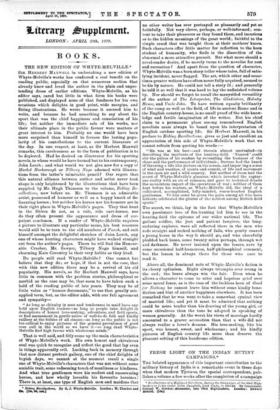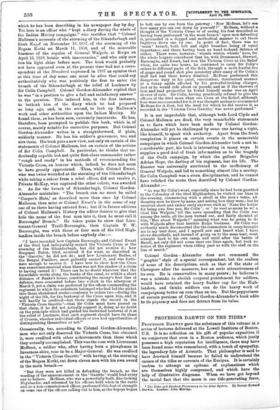FRESH LIGHT ON THE INDIAN MUTINY CAMPAIGNS.* THE belated appearance
of this important contribution to the military history of India is a remarkable event in these days when that modern Tyrtaaus, the special correspondent, pub- lishes a volume a few weeks after the completion of a campaign
• RecoUertious of a Highland Subaltern, during the Campaigns of the 931,1 High. landers n India under Colin Campbell, Lord Clyde, in 1867.68. By Lieutmmat- Colonel W. Gordon-Alexander, late 93rd Highlanders. London Edward Arnold. (165.1
which he has been describing in his newspaper day by day Yet here is an officer who "kept a diary during the whole of the Indian Mutiny campaigns," who testifies that "Colonel Malleson's accounts of the storming of the Sikandarbagh and Shah Najaf on November 16, 1857, of the storming of the Begam Kothi on March 11, 1858, and of the miserable business of the repulse of General Walpole at Ruiya on April 15, 1858, bristle with inaccuracies," and who only now lets his light shine before men. The book would probably
not have appeared even at the present time had not a corre- spondent of the Standard expressed in 1897 an opinion that
at this time of day some one must be alive that could say authoritatively who was positively the first to enter the breach of the Sikandarbagh at the relief of Ltacknow by Sir Colin Campbell. Colonel Gordon-Alexander replied that he was "in a position to give a fall and satisfactory answer" to the question. This induced him, in the first instance, to bethink him of the diary which he had prepared so long ago, and, in the second, to look up Malleson's work and other authorities upon the Indian Mutiny. He found them, as has been seen, extremely inaccurate. He has, therefore, been prompted to publish this book, which is, of coarse, mainly notable for corrective purposes. But Colonel Gordon-Alexander writes in a straightforward, if plain, soldierly manner. He has his soldier's grievances, too, and airs them. His book puts a new view, not only on certain of the statements of Colonel Malleson, but on certain of the actions of Sir Colin Campbell. In particular, he thinks that un- doubtedly capable but not quite first-class commander rather "rough and ready" in his methods of recommending the Victoria Cross, an honour which, indeed, he does not seem to have greatly appreciated. Thus, while Colonel Ewart, who was twice wounded at the storming of the Sikandarbagh while taking a colour from a rebel officer, did not receive it, Private McKay, who captured the other colour, was awarded it. As for the breach of Sikandarbagh, Colonel Gordon- Alexander maintains: "The breach can no more be called Cooper's Hole,' as described more than once by Colonel Malleson, than mine or Colonel E wart's in the sense of any one of us three having entered first; but if in future editions of Colonel Malleson's History the editor desires to give that hole the name of the first man into it, then he must call it Burroughs' Breach." He takes pains to show that Lieu- tenant-General Traill-Burroughs, then Captain T. W. Burroughs, was with three or four men of the 93rd High- landers inside the breach before anybody else :—
" I have recorded how Captain Burroughs and Colonel Ewart of the 93rd had indisputably earned the Victoria Cross at the storming of the Sikandarbagh, but did not receive it; how Sergeant Paton, 93rd, received it for what, as described in the Gazette,' he did not do ; and how Lieutenant Butler, of the Bengal Fusiliers, most gallantly earned it, and was fortu- nate enough to receive it. I have now to show how the Cross was sometimes received when there was not the shadow of a claim to having earned it There can be no doubt whatever that the formidable works along the banks of the canal, to within a short distance of Banks's house, constituting the enemy's first line of defence, were evacuated before two o'clock in the afternoon of March 9, yet a claim was preferred by the officer commanding the regiment to which the subaltern belonged who had led the picket into these abandoned works—contrary to orders two—during the night of the 9th, for the bestowal of the Cross upon him, and it will hardly be credited—but there stands the record in the
Victoria Cross Gazette '—that Sir Colin must have passed on that claim, if he did not actually support it, doing so no doubt on the principle which had guided his restricted bestowal of it at the relief of Lucknow, that each regiment should have its share of Crosses, whether individual officers or men had opportunities of distinguishing themselves or not."
Occasionally, too, according to Colonel Gordon-Alexander, men who not only deserved the Victoria Cross, but obtained it, were credited with other achievements than those which they actually accomplished. This was the case with Lieutenant McBean, a soldier who, after having been a ploughman in Inverness-shire, rose to be a Major-General. He was credited in the "Victoria Cross Gazette" with having, at the storming
of the Begam Kothi, cut down eleven men with his own sword in the main breach:— "But they were not killed in defending the breach, as the wording of the announcement in the 'Gazette' would lead every one to believe. McBean, who was a powerfully built, fine-looking Highlander, and esteemed by his officers both when in the ranks and as a non-commissioned officer, performed this feat of strength on some one of the officers calling out to him, as the Sepoys began to bolt one by one from the gateway : 'Now McBean, let's see how many you can cut down by yourself ?' McBean, without a thought of the Victoria Cross or of seeing his feat described as having been performed in the main breach' upon men defending it, proceeded in a dogged and methodical manner to cut these fugitives down one by one. In point of fact, there was no 'main' breach, both left and right breaches being of equal importance, and there having been no band to-hand defence of either. There were, however. wheels within wheels' here, for the whole brigade considered that he, with Drummond, Stewart, Burroughs, and Ewart, had won the Victoria Cross at the Belief when, tor quite two hours, he continued to carry Sir Colin's orders to different parts of the field, through a most fearful fire of grape and round shot plus musketry after many of Sir Colin's staff had had their horses disabled. McBean performed this dangerous duty in his quiet, emotionless, determined manner at a funny amble affected by his powerful-looking charger, just as he would ride about on parade, and as if the showers of iron and lead projectiles he found himself under was an April shower of rain. Sir Colin, having practically refused to give the officers of the 93rd more than one Cross at the Relief, although four were recommended for it, it was thought useless to recommend Mc Bean for it then, but the deed for which he did receive it, as recorded in the 'Victoria Cross Gazette,' was never performed."
It is not improbable that, although both Lord Clyde and Colonel Malleson are dead, the very remarkable statements as to facts which have been made by Colonel Gordon- Alexander will yet be challenged by some one having a right, like himself, to speak with authority. Apart from the fresh complexion it places on certain events in the memorable campaigns in which Colonel Gordon-Alexander took a not in- considerable part, his book is interesting in many ways. It supplies a good deal of fresh information as to the tragedy of the Oudh campaign, by which the gallant Brigadier Adrian Hope, the darling of his regiment, lost his life. The disaster was universally attributed to the inefficiency of General Walpole, and led to something almost like a mutiny. Sir Colin Campbell was a stern disciplinarian, and he cannot have relished the scene thus described by Colonel Gordon- Alexander :— " As was Sir Colin's wont, especially since he had been gazetted to the Colonelcy of the 93rd Highlanders, he visited our lines in the evening, commencing with a stroll in the men's tents, ad- dressing men he knew by name, and asking how they were ; but he received short and rather surly answers, such as • Nene the better for being awa frae you, Sir Colin ' ; or 'As west as mann be wi' a chiel like Walpole,' till the news spreading that Sir Colin was among the tents, all the men turned out, and fairly shouted at him, Hoo aboot Walpole ? ' meaning what was he going to do with Walpole after that terrible Ruiya business. Sir Colin was evidently much disconcerted (for the commotion in camp brought me to my tent door, and I myself saw and heard what I have above described), and instead of going on to the mess tent, went straight back to his own camp, and until after the battle of Bareli, not only did not come near our lines again, but took no notice of the regiment when riding past us with the staff on the line of march."
Colonel Gordon - Alexander does not command the "graphic" style of a special correspondent, but the realism of some of his descriptions, such as that of the state of Cawnpore after the massacre, has an eerie attractiveness of its own. He is conservative in many points ; he believes it was a mistake to abolish corporal punishment for soldiers, would have retained the heavy feather cap for the High- landers, and thinks soldiers can do the heavy work of campaigning better on rum than on tea. But the pepperiness of certain portions of Colonel Gordon-Alexander's book adds to its piquancy and does not detract from its value.























































 Previous page
Previous page